Michigan
School board orders LGBTQ+ mural removed from health clinic
“We reluctantly were willing to accept to ensure the children continue to have access to medical and behavioral health care”

GRANT, Mich. – The battle over a controversial LGBTQ+ affirming mural painted on the wall at the Child and Adolescent Health Center at Grant Middle School climaxed Monday after the Grant Public Schools Board of Education voted to renew the healthcare provider’s contract with the stipulation the mural is removed.
The Muskegon Chronicle reported that Superintendent Brett Zuver said the new contract stipulates that Family Health Care, the provider that operates the Child and Adolescent Health Center, must remove the mural, which was painted by a student who won an art contest, by the end of October.
In a statement Monday, Family Health Care spokesperson Alan Neushwander said the mural highlighted diversity and inclusion, values that are important to the health care provider.
“While it is disappointing that the mural must be removed by the end of October, it’s a compromise we reluctantly were willing to accept to ensure the children of the Grant community continue to have access to medical and behavioral health care,” Neushwander said in the statement, which can be viewed in full here.
Some parents of teenagers in this Western Michigan small town about an hour North of Grand Rapids were extremely angry over the LGBTQ+ affirming mural.
During a school board meeting last year, the anger spilled over into heated arguments with some in the audience saying the transgender flag, a video game character and other symbols painted in the mural were ‘Satanic.’ Prior to the board meeting social media threads on posts critical of the mural had become the mainstay of community discussions around Grant.
The student artist from Grant High School, Evelyn Gonzales, who was responsible for creating the mural maintains the artwork is intended to be inclusive. “I put my art up there to make people feel welcome,” she told WZZM 13, the ABC News affiliate in Grand Rapids in October of 2022.
Gonzales explaining her thinking and creative process did little to calm the enraged parents WZZM 13 reported as after she made her remarks and fled in tears one stood up and angrily said “I feel like she did a really good job finding excuses to defend the things she put on,” said Katelyn Thompson. “None of us are that stupid.”
As for the transgender flag, one parent implied it’s a sickness.
“When adults pretend things that are like real life, it’s a mental illness,” says Danielle Beight. “We need counselors, we need medication that’s going to help bipolar disorder, fix their brains.”
With another saying it is discriminatory against Christian beliefs.
“We and our administration should embrace that and get all of this hate material out of our schools, because it is hate material,” says Nate Thompson.
While some parents called for the mural to be removed or altered, WZZM reported that Grant Public Schools handbook includes a nondiscriminatory policy, saying in part, “any form of discrimination or harassment can be devastating to an individuals academic progress, social relationship and/or personal sense of self-worth.”
Michigan
Governor & Michigan lawmakers recognize June as Pride month
House lawmakers passed a resolution Wednesday recognizing June 2024 as Pride month and acknowledging the push for equality for LGBTQ+ people
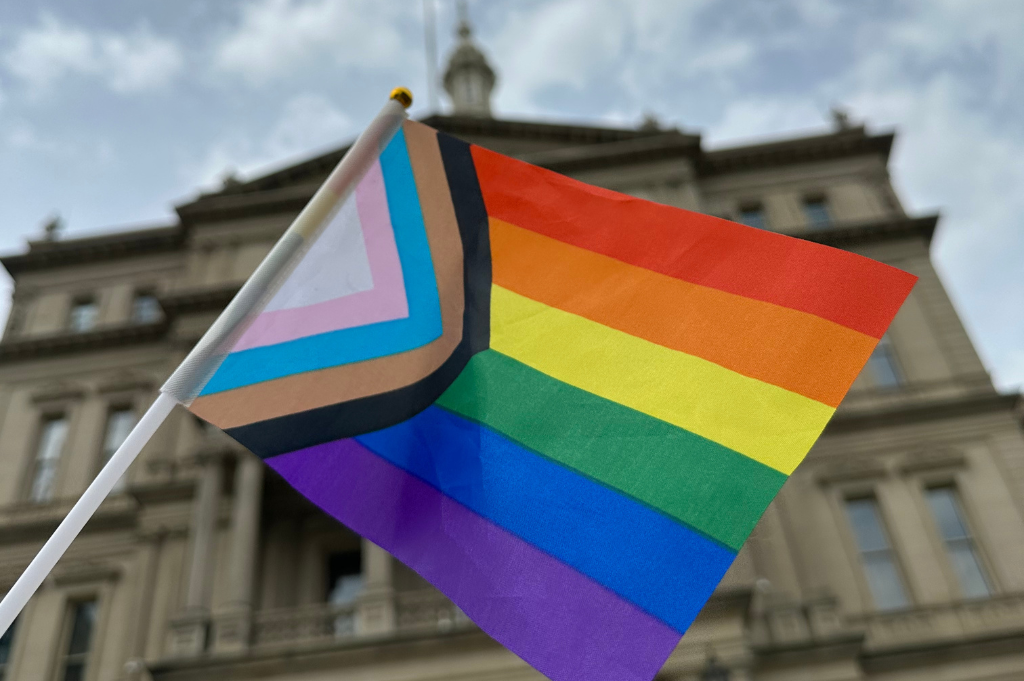
By Lucy Valeski | LANSING, Mich. – It’s Pride month in Michigan, an annual recognition of the LGBTQ+ community marked by parades and celebrations in every corner of the state.
In Lansing, House lawmakers passed a resolution Wednesday recognizing June 2024 as Pride month and acknowledging the push for equality for LGBTQ+ people in Michigan, past and present.
The LGBTQ+ community has celebrated Pride month since June 1970, the one-year anniversary of the Stonewall riots in New York. The month was first recognized in the United States in 1999 by President Bill Clinton. The Michigan legislature did not formally recognize Pride month until 2021.
“Resolutions like this aren’t policy, obviously,” state Rep. Laurie Pohutsky (D-Livonia) told the Advance. “But it’s important that we do everything we can to make sure that folks in Michigan, and particularly our LGBTQ residents, know that they’re welcome and that they have a government that recognizes them and appreciates them and respects them.”
Pohutsky, a member of the House LGBTQ+ Caucus, sponsored the resolution. She said the resolution is especially important this year, as GOP lawmakers previously blocked the recognition of Pride month.
In 2022, the then-GOP-controlled Senate blocked a vote on a resolution recognizing Pride month. Republican lawmakers wanted to add language reflecting that not every Michigander “agrees with the lifestyle of the LGBT community.” The resolution passed the previous year in 2021, but not in 2019 or 2020.
“There was such a long time where we couldn’t even get the bare minimum of a Pride resolution passed,” Pohutsky said.
Gov. Gretchen Whitmer also formally recognized the Pride month with a proclamation on June 1. Whitmer was the first governor to march at the Motor City Pride parade and fly a Pride flag on a state building in 2019.
“Michigan will always be a place where everyone has the freedom to be who they are and love who they love,” Whitmer said in a release. “Our work is not done, but every year, we make progress to move Michigan forward. Let’s keep getting it done.”
LGBTQ+ legislation in Michigan
During this session, Michigan’s Democratic-controlled Legislature has passed several bills aimed at protecting the LGBTQ+ community in the state. Whitmer, a Democrat, signed legislation expanded Michigan’s anti-discrimination law to include LGBTQ+ people last year and banned conversion therapy for minors.
These bills had languished in the Legislature for years when it was led by Republicans.
Lawmakers are also working on a bill that would ban gay and trans panic defenses. The defense excuses crimes, like assault, of an LGBTQ+ person because it lets the perpetrator blame their identity.
But Pohutsky said it is important to think about how any bill will impact the LGBTQ+ community. Laws relating to legal name changes or reproductive rights can affect queer Michiganders in unique ways, she said.
“I think one of the really wonderful things that has happened as a positive consequence of us electing more LGBTQ leaders is that we are more apt to recognize how policies impact the community, and that’s been really important,” Pohutsky said.
******************************************************************************************

Lucy Valeski is a States Newsroom fellow for the Michigan Advance. She is currently a student at the University of Missouri, where she studies journalism and political science. She previously covered local government for the Columbia Missourian, statewide news for Missouri Business Alert and technology policy for MLex in Brussels.
******************************************************************************************
The preceding story was previously published by the Michigan Advance and is republished with permission.
Corporate media aren’t cutting it. The Michigan Advance is a nonprofit outlet featuring hard-hitting reporting on politics and policy and the best progressive commentary in the state.
We’re part of States Newsroom, the nation’s largest state-focused nonprofit news organization.
Michigan
Michigan State University investigating alleged hate crime
MSU’s interim vice president and chief safety officer notes that the incident occurred during the school’s LBGTQ Pride Month
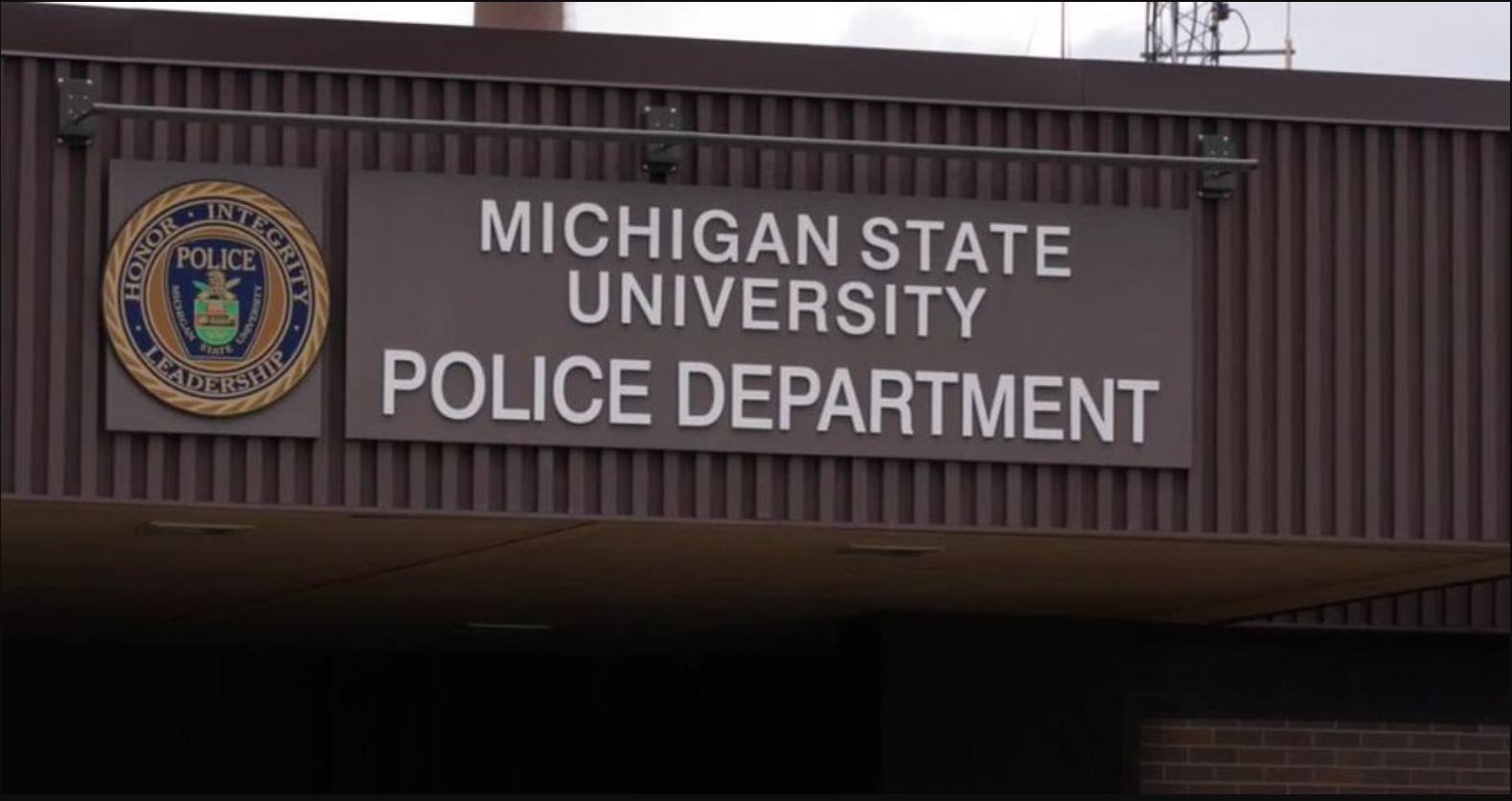
EAST LANSING, Mich. – Michigan State University Police and Public Safety officials confirmed that a group of seven suspects assaulted two victims on Monday, April 15, 2024, at the MSU Main Library, potentially selecting the victims because of the perpetrators sexual orientation bias.
According to MSU police, a warning was issued to all MSU students, faculty and staff on Monday, and the suspects were identified on Tuesday. None of the suspects are affiliated with MSU. The investigation into this incident is ongoing.
Once the investigation is completed, it will be submitted to the Ingham County Prosecutor’s Office with a request for charges against the suspects.
MSU Vice President and Spokesperson Emily Guerrant said two MSU students were followed into the library by seven non-MSU students who appeared to be of high school age, the Lansing State Journal reports. The suspects continued to follow the two MSU students to the third-floor study area. A video posted to an anonymous messaging board shows a physical altercation ensued.
Fox 47 News in Lansing reported that a student at MSU and a member of a group dedicated to advocating for transgender and non-binary students told the station: “I was shocked and appalled to see that happened on this campus,” said Lyra who asked that only her first name was used.
MSU’s Gender and Sexuality Campus Center is offering online and in-person support for students following the incident.
“It is important to recognize that crimes are never the fault of a victim,” the school wrote in a statement. “Anyone who believes they have been discriminated against or harassed is encouraged to report the incident(s) to the MSU Office of Institutional Equity.”
Doug Monette, MSU’s interim vice president and chief safety officer, and Vennie Gore, the senior vice president for the school’s student life and engagement department, addressed students and faculty in a separate statement on Tuesday, according to NBC News. The statement notes that the incident occurred during the school’s LBGTQ Pride Month and that it was also based on the students’ “racial identities” in addition to their sexualities.
Michigan
Michigan Democrats spar over LGBTQ+ inclusive hate crime law
Michigan could soon become the latest state to pass an LGBTQ-inclusive hate crime law but lawmakers disagree on just what kind of law to pass

By Rob Salerno | LANSING, Mich. – Michigan could soon become the latest state to pass an LGBTQ-inclusive hate crime law, but the state’s Democratic lawmakers disagree on just what kind of law they should pass.
Currently, Michigan’s Ethnic Intimidation Act only offers limited protections to victims of crime motivated by their “race, color, religion, gender, or national origin.” Bills proposed by Democratic lawmakers expand the list to include “actual or perceived race, color, religion, gender, sexual orientation, gender identity or expression, ethnicity, physical or mental disability, age, national origin, or association or affiliation with any such individuals.”
Democratic Governor Gretchen Whitmer and Attorney-General Dana Nessel have both advocated for a hate crime law, but house and senate Democrats have each passed different hate crimes packages, and Nessel has blasted both as being too weak.
Under the house proposal that passed last year (HB 4474), a first offence would be punishable with a $2000 fine, up to 2 years in prison, or both. Penalties double for a second offense, and if a gun or other dangerous weapons is involved, the maximum penalty is 6 years in prison and a fine of $7500.
But that proposal stalled when it reached the senate, after far-right news outlets and Fox News reported misinformation that the bill only protected LGBTQ people and would make misgendering a trans person a crime. Bill sponsor Rep. Noah Arbit was also made the subject of a recall effort, which ultimately failed.
Arbit submitted a new version of the bill (HB 5288) that added sections clarifying that misgendering a person, “intentionally or unintentionally” is not a hate crime, although the latest version (HB 5400) of the bill omits this language.
That bill has since stalled in a house committee, in part because the Democrats lost their house majority last November, when two Democratic representatives resigned after being elected mayors. The Democrats regained their house majority last night by winning two special elections.
Meanwhile, the senate passed a different package of hate crime bills sponsored by Sen. Sylvia Santana (SB 600) in March that include much lighter sentences, as well as a clause ensuring that misgendering a person is not a hate crime.
Under the senate bill, if the first offense is only a threat, it would be a misdemeanor punishable by 1 year in prison and up to $1,000 fine. A subsequent offense or first violent hate crime, including stalking, would be a felony that attracts double the punishment.
Multiple calls and emails from The Blade to both Rep. Arbit and Sen. Santana requesting comment on the bills for this story went unanswered.
The Attorney-General’s office sent a statement to The Blade supporting stronger hate crime legislation.
“As a career prosecutor, [Nessel] has seen firsthand how the state’s weak Ethnic Intimidation Act (not updated since the late 1980’s) does not allow for meaningful law enforcement and court intervention before threats become violent and deadly, nor does it consider significant bases for bias. It is our hope that the legislature will pass robust, much-needed updates to this statute,” the statement says.
But Nessel, who has herself been the victim of racially motivated threats, has also blasted all of the bills presented by Democrats as not going far enough.
“Two years is nothing … Why not just give them a parking ticket?” Nessel told Bridge Michigan.
Nessel blames a bizarre alliance far-right and far-left forces that have doomed tougher laws.
“You have this confluence of forces on the far right … this insistence that the First Amendment protects this language, or that the Second Amendment protects the ability to possess firearms under almost any and all circumstances,” Nessel said. “But then you also have the far left that argues basically no one should go to jail or prison for any offense ever.”
The legislature did manage to pass an “institutional desecration” law last year that penalizes hate-motivated vandalism to churches, schools, museums, and community centers, and is LGBT-inclusive.
According to data from the U.S. Department of Justice, reported hate crime incidents have been skyrocketing, with attacks motivated by sexual orientation surging by 70% from 2020 to 2022, the last year for which data is available.
Twenty-two states, DC, Puerto Rico, and the US Virgin Islands have passed LGBTQ-inclusive hate crime laws. Another 11 states have hate crime laws that include protections for “sexual orientation” but not “gender identity.”
Michigan Democrats have advanced several key LGBTQ rights priorities since they took unified control of the legislature in 2023. A long-stalled comprehensive anti-discrimination law was passed last year, as did a conversion therapy ban. Last month the legislature updated family law to make surrogacy easier for all couples, including same-sex couples.
A bill to ban the “gay panic” defense has passed the state house and is due for a senate committee hearing April 17.
******************************************************************************************

Rob Salerno is a writer and journalist based in Los Angeles, California, and Toronto, Canada.
Michigan
Michigan venue: No same-sex marriages, formal complaint filed
The business owned by Mitch and Kelli VanOverloop said they were “discussing things further with their lawyer”

HUDSONVILLE, Mich. – A wedding venue in a West Michigan farming community has sparked a formal complaint to the Michigan Department of Civil Rights and the Michigan Attorney General’s Office over its policies on same-sex weddings.
The Old Wooden Barn wedding venue in Hudsonville, Mich. states its marriage policy clearly online:
“Because God has ordained marriage and defined it as the covenant relationship between a man, a woman and Himself, the Old Wooden Barn will only recognize marriages between a biological man and a biological woman. Further, the staff of the Old Wooden Barn shall only participate in and host weddings between a man and a woman. We thank you for respecting our Christian family values.”
According to a local media outlet, the Holland Sentinel, the Surfus Foundation, an LGBTQ+ foundation based in Grand Rapids filed a formal complaint with the Michigan Department of Civil Rights and the Michigan Attorney General’s Office last month.
The Sentinel reported that the foundation feels the policy “is a clear violation” of the Elliot-Larsen Civil Rights Act Expansion of 2023 and the Michigan Supreme Court’s decision in Rouch World vs. the Michigan Department of Civil Rights.
In a letter to both parties, signed by Chris Surfus, the foundation requests “enforcement of laws against this and similar businesses across the state of Michigan that choose to create policies that discriminate against the LGBTIQ+ community.”
The Elliott-Larsen Civil Rights Act was created to eliminate discrimination in employment, housing, public service and the use of public accommodations. In 2023, the law was amended to add sexual orientation, gender identity and gender expression as protected classes.
The business owned by Mitch and Kelli VanOverloop told The Sentinel they were “discussing things further with their lawyer.”
Michigan
Anti-LGBTQ+ Michigan salon owner faces discrimination charges
Studio 8 and Geiger could have state licensing certifications revoked based on violation of Michigan’s Elliott-Larsen Civil Rights Act
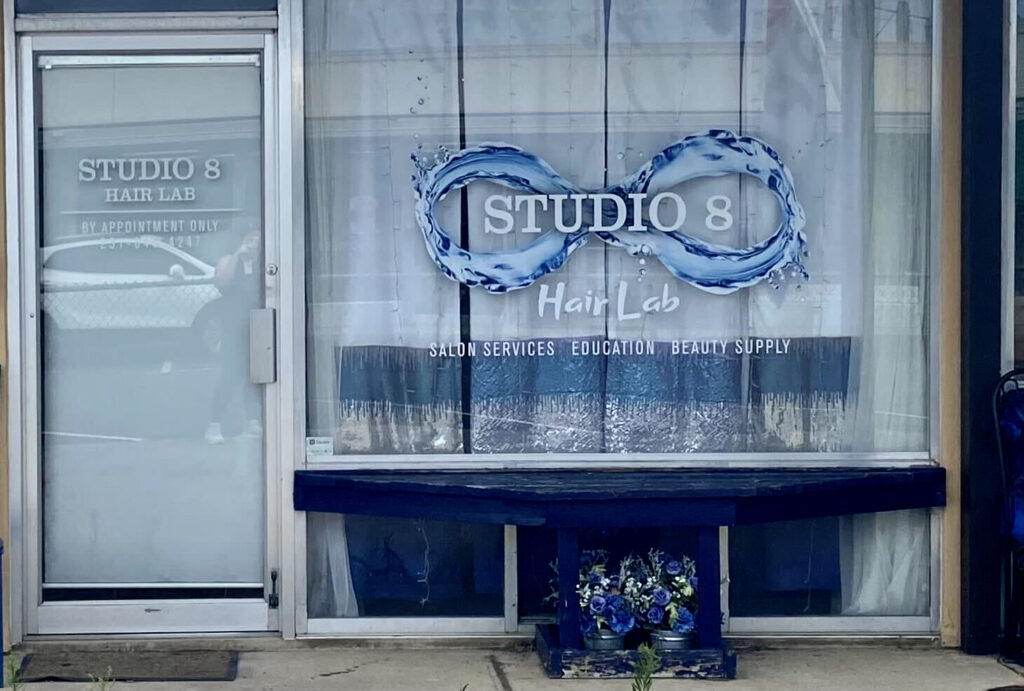
By Lily Guiney | LANSING, Mich. – The Michigan Department of Civil Rights (MDCR) has issued a charge of discrimination against Studio 8 Hair Lab, the Traverse City salon that drew national attention in July for anti-trans online posts made by its owner, Christine Geiger.
Geiger declared in an initial Facebook post in July that her salon would deny service to transgender and nonbinary people and said that she was protected by “free speech.”
“If a human identifies as anything other than a man/woman please seek services at a local pet groomer,” Geiger wrote in the post. “You are not welcome at this salon.”

The charge reasoned that Michigan law “makes it is unlawful for Studio 8 to print, circulate, post, mail, or otherwise cause to be published” a statement which indicates that the “full and equal enjoyment” of goods or services will be refused because of sex, or that an individual’s patronage is “objectionable, unwelcome, unacceptable, or undesirable” for the same reason.
In a Wednesday morning press conference, MDCR Director John Johnson said that Geiger’s post, and subsequent doubling down on her stances, were in violation of Michigan’s Elliott-Larsen Civil Rights Act (ELCRA).
“This is not a complicated case,” Johnson said. “It is not a case that relies on complex legal concepts or that requires expensive or convoluted arguments to explain. Christine Geiger has responsibilities under law as the owner of a business offering services to the public in the state of Michigan.”
The Advance called Geiger for comment at the salon, but the voicemail was full.
MDCR officials said that the charge is one of unlawful advertisement, not free speech. According to the charge, even though Geiger didn’t physically remove someone from her salon based on their gender identity, the posts she made still negatively impacted LGBTQ+ members of the community.
“As a direct and proximate result of Respondent’s unlawful discrimination, Claimants L.M., H.S. and M.H. have suffered the loss of full and equal enjoyment of a public accommodation due to Respondent’s published statements,” the charge read.
MDCR Director of Enforcement Marcellina Trevino said that the department’s investigative process was followed to determine whether there was cause for a charge of discrimination, including trying to facilitate a conciliatory meeting with Geiger.
“Our staff attorney attempted to set up a meeting with [Geiger] to address the issues in the complaint and to go over the sufficient evidence that we found,” Trevino said. “To our dismay, the respondent refused to participate in conciliation, and therefore our staff attorney drafted a charge which was filed this morning with the Michigan Office of Administrative Hearings and Rules.”
Geiger filed her own lawsuit on Oct. 25 against the city of Traverse City and the three individuals who submitted complaints to the MDCR, citing her business’s right to “use its talents and the expressive platform they have to celebrate and promote God’s design for male and female.”
While MDCR officials were unable to comment on Geiger’s ongoing lawsuit, Trevino said that the three complainants, two of whom are nonbinary, are protected from certain forms of retaliation under ELCRA.
“Under the Elliott Larsen Civil Rights Act, there are protections against retaliation for participating in a protected activity, such as filing an unlawful discrimination complaint with our department,” Trevino said.
The next step for the Studio 8 case will be awaiting a hearing before an administrative law judge. The MDCR’s charge requests that Geiger pay the claimants for emotional distress and “mental anguish” her posts caused. If decided after a hearing, Studio 8 and Geiger could have state licensing certifications revoked based on violation of ELCRA.
MDCR Director of Legal Affairs Bryant Osikowicz said that the charge shouldn’t be misconstrued as an issue of religion or freedom of speech.
“I will just say that free speech is not absolute,” Osikowicz said. “The classic example from law school is you can’t yell fire in a crowded theater, that type of thing, and we were very specific in this charge. This is not a free speech case. This is a discriminatory advertisement case.”
******************************************************************************************

Lily is a contributor to the Michigan Advance and a former reporting intern. Her coverage areas included state government and politics, including abortion rights and gun violence prevention issues.
*************************************************************************************
The preceding story was previously published by the Michigan Advance and is republished with permission.
Corporate media aren’t cutting it. The Michigan Advance is a nonprofit outlet featuring hard-hitting reporting on politics and policy and the best progressive commentary in the state.
Related:
Michigan
Federal lawsuit: Hamtramck’s Pride flag ban is unconstitutional
When the council voted to ban Pride flags in June, conservative Muslims clashed with LGBTQ+ residents with some shouting homophobic slurs
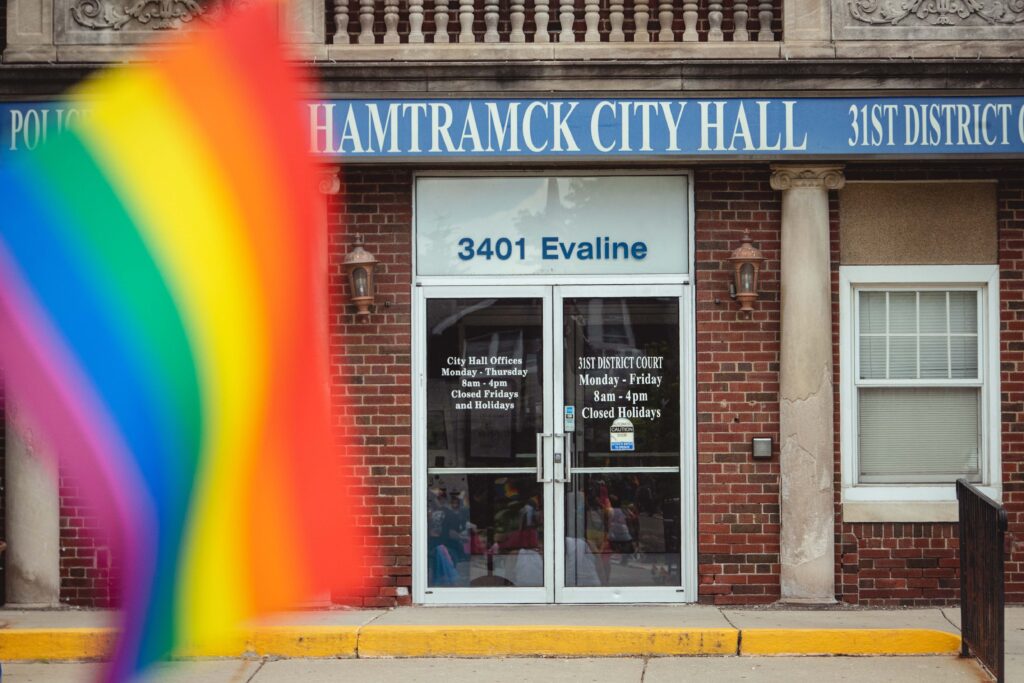
By Steve Neavling | HAMTRAMCK, Mich. – A federal lawsuit filed Monday alleges the city of Hamtramck’s Pride flag ban violates free speech rights and numerous other state and federal laws.
The lawsuit in the U.S. District Court in Detroit was filed on behalf of former Hamtramck Human Relations Commission members Russ Gordon and Cathy Stackpoole. The Hamtramck residents were fired from the commission in July, a month after the all-Muslim city council unanimously approved a flag “neutrality” ordinance in July.
Although the ban also prohibits religious, ethnic, racial, and political flags, the impetus was the LGBTQ+ Pride flag, which many local Muslims complained was an affront to their religion.
The lawsuit, filed by attorney Marc M. Susselman, argues the ban violates the First Amendment right to free speech and the equal protection clause of the 14th Amendment.
“It is unconstitutional for government to select what speech will be permitted, and what speech will be prohibited, based on the content or viewpoint of the message conveyed by the speech,” the lawsuit states.
Susselman argues that the ban is not neutral because it allows the display of the Prisoners of War flag and other countries’ flags.
The lawsuit seeks to overturn the flag ban and reinstate Gordon and Stackpoole.
In an act of defiance, Gordon and Stackpoole displayed a Pride flag on public property on Joseph Campau Avenue on July 9. Police removed the flag after a councilman complained.
Two days later, the city council unanimously approved a resolution removing Gordon and Stackpoole from the Human Relations Commission.
The lawsuit argues that Gordon and Stackpoole did nothing wrong when they displayed the Pride flag.

“In so doing, Gordon was not violating the law,” the lawsuit states. “An unconstitutional Resolution is itself a violation of law, and a citizen who violates an unconstitutional, and therefore unlawful, Resolution cannot be violating the law. Rather, the Councilmen who voted in favor of the unconstitutional Resolution violated the law by violating the Constitution.”
Since the ban, dozens of Pride flags on private property have been vandalized, and residents in the diverse city say they feel alienated and maligned by conservative Muslims who view homosexuality as a sin and peddle false narratives about children being indoctrinated in schools.
More than half of Hamtramck’s residents are believed to be Muslim. In January 2022, Hamtramck became the first city in the U.S. to have an all-Muslim City Council. The mayor, Amer Ghalib, is also Muslim.
Tensions between conservative Muslims and progressive began to simmer in the summer of 2021, when then-Mayor Karen Majewski broke a 3-3 City Council tie to fly a Pride flag outside of City Hall.
A backlash ensued as conservative Muslims began to complain, saying the flag was an affront to their religion. Ghalib, a health care worker and Muslim immigrant from Yemen, made the flag a campaign issue and handily defeated Majewski, a four-term mayor, in November 2021.
When the council voted to ban Pride flags in June, conservative Muslims clashed with LGBTQ+ residents and their allies, with some shouting homophobic slurs. Since then local Muslims have joined forces with conservative Republicans, pledging to create an alliance to oppose LGBTQ+ rights. The coalition is propelled by crackpot ideas that public schools are “grooming” and indoctrinating impressionable children.
This story first ran in the Detroit Metro Times. Follow them: Google News | NewsBreak | Reddit | Instagram | Facebook | Twitter
******************************************************************************************

Steve Neavling is an award-winning investigative journalist with the Detroit Metro Times. He operated Motor City Muckraker, an online news site devoted to exposing abuses of power and holding public officials accountable.
Neavling also hosted Muckraker Report on 910AM from September 2017 to July 2018. Before launching Motor City Muckraker, Neavling was a five-year veteran of the Detroit Free Press, covering Detroit’s city hall.
*************************************************************************************
The preceding story was published by the Michigan Advance and is republished with permission.
Corporate media aren’t cutting it. The Michigan Advance is a nonprofit outlet featuring hard-hitting reporting on politics and policy and the best progressive commentary in the state.
Michigan
Michigan: 22nd state to ban conversion therapy for LGBTQ+ youth
The ban is part of several LGBTQ+ rights measures considered this term after Democrats have the majority in both chambers

By Anna Liz Nichols | LANSING, Mich. – A ban on conversion therapy for minors was signed into law in Michigan Wednesday in the latest development of the new Democratic-led state Legislature’s push for LGBTQ+ rights in Michigan.
Gov. Gretchen Whitmer said in a news release Wednesday that as the mother of a gay daughter, she is grateful to have the opportunity to make the state a more welcoming place to live for everyone’s children.
“Today, we are banning the horrific practice of conversion therapy in Michigan and ensuring this is a state where you can be who you are,” Whitmer said. “Let’s continue working together to ensure anyone can ‘make it’ in Michigan, expand fundamental freedoms, and fight back against any and all forms of discrimination.”
The legislation, HB 4616 and HB 4617, effectively bars mental health professionals from seeking to alter a minor’s sexual orientation or gender identity, or risk facing disciplinary action that could result in the loss of their professional licenses.
The legislation does not prohibit the practice of gender-affirming care or support during exploration of gender or sexuality or counseling to prevent unsafe relationship practices.
There is no evidence that conversion therapy works, but there is evidence that shows it is dangerous to children, bill sponsor Rep. Felicia Brabec (D-Pittsfield Twp.), who is also a clinical psychologist, said in the news release from the governor’s office and in her testimony on the House floor in June.
“I am acutely aware that kids need to be free to express themselves without the fear or threat of damaging pseudo-psychology like conversion therapy. With the support of several mental health organizations throughout our state and nation, I can confidently say that this law will help to ensure that therapists like myself continue to do no harm in our practices, while protecting the LGBTQ youth in our state,” Brabec said.
Proponents of banning conversion therapy say legislation like what’s being implemented in Michigan prevents suicide.
When Whitmer signed an executive order in 2021 banning the use of state and federal funds being used for conversion therapy on minors, the Trevor Project, a non-profit group working to create a safer environment for LGBTQ+ kids, applauded the action. The Trevor Project added at the time that a 2020 report by the Williams Institute at UCLA School of Law found that lesbian, gay and bisexual youth who experienced conversion therapy were more than twice as likely to report multiple suicide attempts in the last year than their peers who hadn’t been in conversion therapy.
Erin Knott, executive director of Equality Michigan, which works to reach out and advocate for LGBTQ+ Michiganders, said, “today is a good day” because the ban is a win for Michigan against the “torture” of conversion therapy.
‘The practice is inherently discriminatory, they are cruel, inhumane and degrading treatments that, depending on the severity, physical or mental pain, the suffering inflicted on a victim oftentimes amounts to torture,” Knott said. “This is just one step in terms of mitigating torture and trauma to our kids as well as letting them know or giving them a signal that they are loved and supported and valued as they are, there’s no need to attempt to change them for who they are or how they identify.”
The ban is part of several LGBTQ+ rights measures considered this term after Democrats have the majority in both chambers in the state legislature for the first time in nearly 40 years. The state’s 1976 civil rights laws got an update in March when Whitmer signed into law legislation to extend protections against discrimination on the basis of gender identity and sexual orientation.
Currently, expansions to the state’s hate crime laws, which would add protections for abuses suffered by individuals because of their sexual orientation or gender identity are making their way through the Legislature.
The legislation signed Wednesday creates penalties for licensed mental health professionals, but doesn’t address unlicensed professionals who perform conversion therapy, including religious leaders providing conversion therapy with no mental health care licensure.
Related:
However, Brenden Bell, care manager at Affirmations LGBTQ+ Community Center in Ferndale said in his experience, both being in religious ex-gay support groups in the past and in working with individuals at Affirmations, many conversion therapy efforts by religious organizations are led by licensed mental health professionals. So while the legislation may not have the teeth some advocates may hope for, Bell said the legislation does work towards cultural acceptance of the queer community in Michigan.
“I’m just feeling a sense of relief that at least from a cultural perspective we’re starting to recognize and take seriously how harmful this is to people. … We have a lot more work to do in terms of queer rights…but I feel like this is an important step and I feel relieved that this is something we can all finally agree is unequivocally bad and abusive,” Bell said.
But the ban is not supported unequivocally, as all Republican representatives in the House voted against the bills and all but one Republican senator rejected them in the Senate.
Rep. Nancy De Boer (R-Holland), along with several of her Republican colleagues gave similar no vote explanations, saying the bills limit conversations mental health care providers can have with patients and interfere with family conversations.
“I voted to put families over vague mandates and radical political agendas,” De Boer said. “Parents in consultation with qualified medical professionals are better qualified to make important decisions regarding their child’s development, not politicians in Lansing.”
Knott said conversion therapy can actually drive a wedge between kids and their parents, dismantling trust.
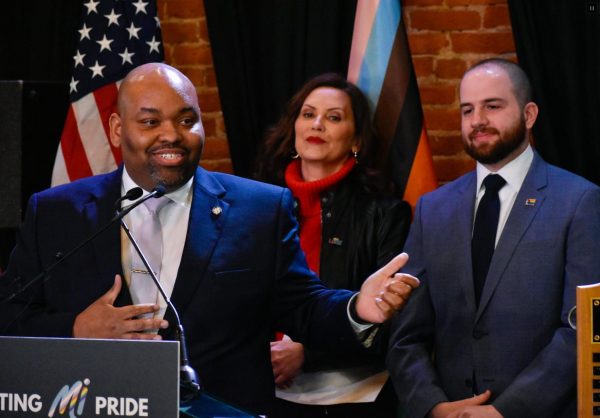
“Conversion therapy is based on this myth that being LGBTQ+ is caused by bad parenting or childhood abuse,” Knott said. “For the kids that are subjected to conversion therapy, the biggest issue that they experience is shame, self-harm and suicide and no child deserves that kind of trauma. They do not deserve to be a trauma survivor when they’re just a kid.”
Bill sponsor Rep. Jason Hoskins (D-Southfield), said the LGBTQ+ community has endured enough under obstacles to acceptance like conversion therapy.
“Today marks a significant step forward as we bid farewell to a harmful and deceitful practice that has inflicted considerable harm upon the LGBTQ+ community since its inception,” Hoskins said in the news release. “With this legislation, we are creating a safer environment for Michigan’s children. It is a powerful message of love, hope, and acceptance, paving the way for brighter days ahead.”
*****************************************************************************************

Anna Liz Nichols covers government and statewide issues, including criminal justice, environmental issues, education and domestic and sexual violence. Anna is a former state government reporter for The Associated Press and most recently was a reporter for the Detroit News. Anna is a graduate of Michigan State University.
*****************************************************************************************
The preceding article was previously published by the Michigan Advance and is republished by permission.
Corporate media aren’t cutting it. The Michigan Advance is a nonprofit outlet featuring hard-hitting reporting on politics and policy and the best progressive commentary in the state.
Michigan
Salon Owner says that T,Q, & + equals pedophiles- refuses service
Responses to her discriminatory post were universally dismissive and castigated her for her position and ideology
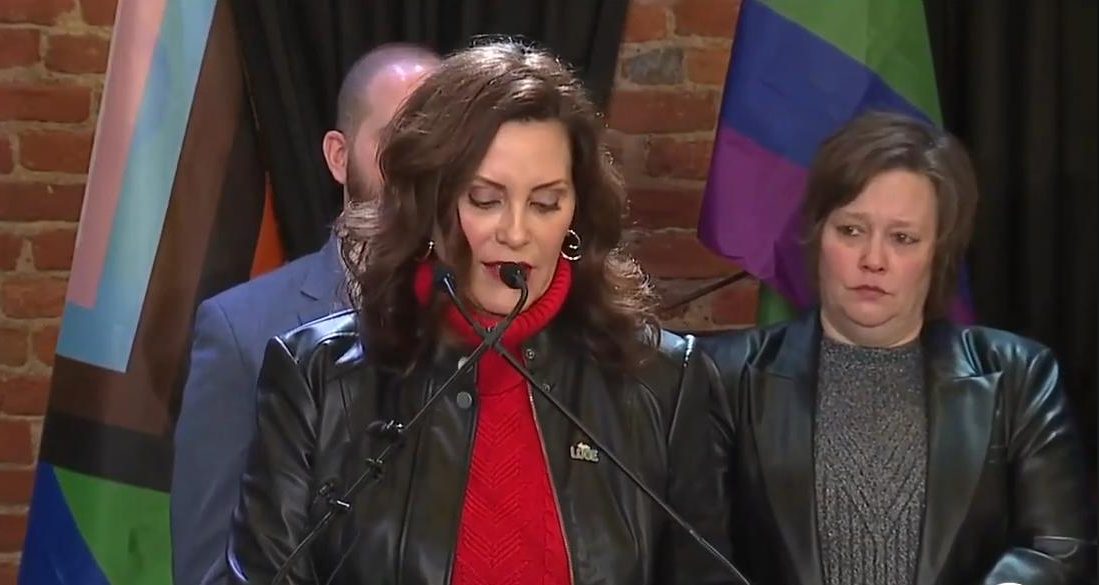
TRAVERSE CITY, MI. – A salon and beauty supply business owner in this Lake Michigan port city of 15,559 people in Northern Michigan declared that she will not serve anyone who identifies other than a man or a woman. Instead she caustically noted that those persons should seek the services of a local pet groomer.
In a Facebook post on her since deleted Facebook page, Christine Geiger, who stated that she is the co-owner of Studio 8 Hair Lab in Traverse City wrote:
“If a human identifies as anything other than a man/woman please seek services at a local pet groomer. You are not welcome at this salon. Period.
This is America; free speech. This small business has the right to refuse services. We are not bound to any oaths as realtors are regarding discrimination. My recent airport experience validates this. *smile with teeth*”
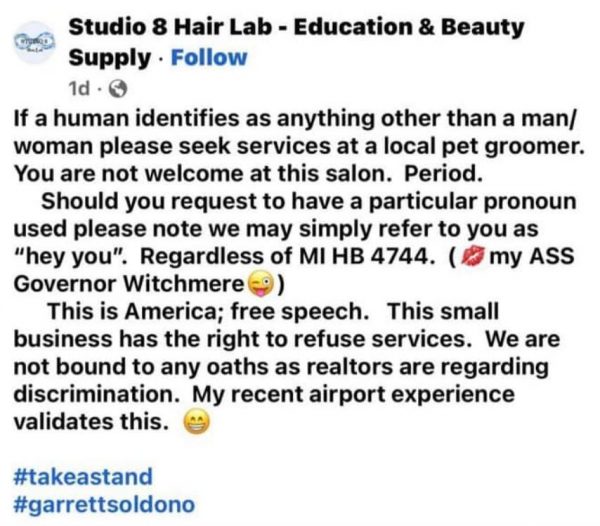
In her Facebook post, Geiger referred to the action taken in March of this year, when Michigan Governor Gretchen Whitmer signed the Elliott-Larsen Civil Rights Act, which expands basic protections for the LGBTQ community.
Should you request to have a particular pronoun used please note we may simply refer to you as “hey you.” Regardless of MI HB 4744. (kiss my ass Governor Witchmere )
The Michigan Bridge reported that the legislation, dubbed historic by supporters and LGBTQ rights advocates, means that employers won’t be able to fire or refuse to hire a person because of their sexual orientation or gender identity.
Landlords and real estate agents cannot refuse to rent or sell a property to a person because of their sexual orientation or gender identity under the legislation, and businesses won’t be able to deny goods or services to LGBTQ patrons.
In response to Geiger’s intolerant Facebook post, the Polestar LGBT+ Community Center of Traverse City responded in a statement:
We’re here to support our community, we stand in support of all members of the LGBTQ+ community! ![]()
![]()
![]()
“In a statement, Traverse City LGBTQ+ organization Polestar said that “Studio 8 Hair Lab’s recent comments comparing members of the queer community to animals are not welcomed in Traverse City, Period.”
“Hate has shown time and time again to be a losing business strategy and we must not allow this blight to take root in our town,” the statement continued. “Statements like the one from Studio 8 undermine the hard work that has been put in to make Traverse City the absolute best that it can be.”
The Studio 8 Hair Lab Facebook page has been deleted, and its Instagram is set to private. In the biography for the business on Instagram, Geiger notes that her business “does not cater to woke ideologies.”
Her Facebook post came days following the U.S. Supreme Court’s 6-3 ruling in 303 Creative v. Elenis, that under the First Amendment, a web designer could refuse to make a website for same-sex marriages based on her religious beliefs.
In another Facebook post in the group ‘Overheard in Traverse City‘ a public group with 70.5K members, Geiger expanded her prejudicial viewpoints echoing Q-Anon and far-right ideology.
“I have no issues with LGB. It’s the TQ+ that I’m not going to support. For those that don’t know what the + is for, it’s for MAP (Minor Attracted Person aka: pedophile) This stance was taken to insure that clients have the best experience and I am admitting that since I am not willing to play the pronoun game or cater to requests outside of what I perceive as normal this probably isn’t the best option for that type of client.

There are over 800 licensed stylists in the County. There are plenty of salons/stylists willing to cater to what I will not. This is a free country and I am not a slave to any narrative.
Conservatives need to acclimate these woke individuals to their new reality. Conservatives have HAD ENOUGH of their ideologies being projected onto us.
We used to “just let them be”. Most of us kept our opinions to ourselves. I mean why look for unnecessary conflict; right? Well the other side used this against us. They mistook our silence for weakness and look where it got us.
So now many of us bark back we speak out and we make it CLEAR where we stand on these issues. They can’t handle it. They aren’t prepared for this. So I am more than willing to take the first rounds of strike backs in hopes that more of you will see this and be inspired to stand up tall and speak your own truths and not simply let them be.”
Responses to her discriminatory post were universally dismissive and castigated her for her position and ideology.
Traverse City is also home to openly gay U.S. Secretary of Transportation Pete Buttigieg and his husband, Michigan-born Chasten Buttigieg, whose parents live in the city. Additionally, Michigan’s Attorney General, Dana Nessel, is a married Out lesbian.
This is the kind of full-throated bigotry and ignorance many advocates and leaders have been warning would become more mainstream due to the rapid increase in homophobia and transphobia in the GOP. America should be moving forward, not backward. There are real problems to solve.
— Chasten Glezman Buttigieg (@Chasten) July 11, 2023
Michigan
Michigan Gov. Whitmer signs statewide LGBTQ protections act
“This bill being signed into law is a beacon of hope and sends a powerful message of acceptance to LGBTQ people across the nation”

LANSING – Michigan Governor Gretchen Whitmer signed the Elliott-Larsen Civil Rights Act on Thursday, which expands basic protections for the LGBTQ community.
The measure, Senate Bill 4 was sponsored by Out State Senator Jeremy Moss who less than a year previously had been shot down by the Republican majority as he attempted to have a non-binding resolution to recognize “Pride Month” adopted by the Senate.
In her signing remarks, Whitmer noted: “In the words of Detroit native Lizzo, it’s about damn time! Bigotry is bad for business. Come to Michigan, you will be respected and protected under the law.”
Sen @JeremyAllenMoss, the state’s highest-ranking openly gay lawmaker, opening the bill signing event. He shepherded the legislation through passage.
— Rachel Louise Just (@RLJnews) March 16, 2023
Nearly this time last year, Moss wasn’t able to get the support of a Leg leader to simply pass a resolution honoring Pride Month.
“As Equality Michigan celebrates this historic step forward, we are standing on the shoulders of giants. Generations of activists have inspired us to fight for justice and equality for all LGBTQ+ Michiganders, and our community has been working to update our state’s civil rights law to explicitly include sexual orientation, gender identity and expression in every single legislative session since Elliott-Larsen was first adopted,” Erin Knott, Executive Director of Equality Michigan said in a statement.”
“We applaud Governor Whitmer for signing this bill into law, and are humbled by this pro-equality legislature that made amending ELCRA a top priority. Senator Jeremy Moss and Representative Jason Hoskins introduced this legislation and championed it all the way through to the finish line.
The victory we have today in Michigan is a great one, but it’s also one we don’t take lightly at this moment. Let it not be lost on us that this privilege, however hard-earned, is a unique one that exists amid a nationwide political assault on LGBTQ+ people, especially trans and non-binary youth, and their families. There are over 400 anti-trans bills moving across state legislatures in the US, twice the amount introduced last year.”
“This bill being signed into law is a beacon of hope and sends a powerful message of acceptance to LGBTQ people across the nation. At The Trevor Project, we work every day to protect the lives of LGBTQ youth, and days like today prove that in generations to come, both their legal and lived equality will no longer be fodder for political debate,” said Troy Stevenson, Director of State Advocacy Campaigns for The Trevor Project.
“Our research shows that having at least one accepting adult can reduce the risk of a suicide attempt among LGBTQ young people by 40 percent. We applaud the elected leaders, advocates and Gov. Whitmer for making this a reality, and affirming the dignity and rights of LGBTQ Michiganders by codifying these protections into law.”
Michigan
Michigan House passes landmark LGBTQ+ civil rights bill
Equality Michigan and its predecessors have fought for decades to bring the LGBTQ+ community under the protection of the Act
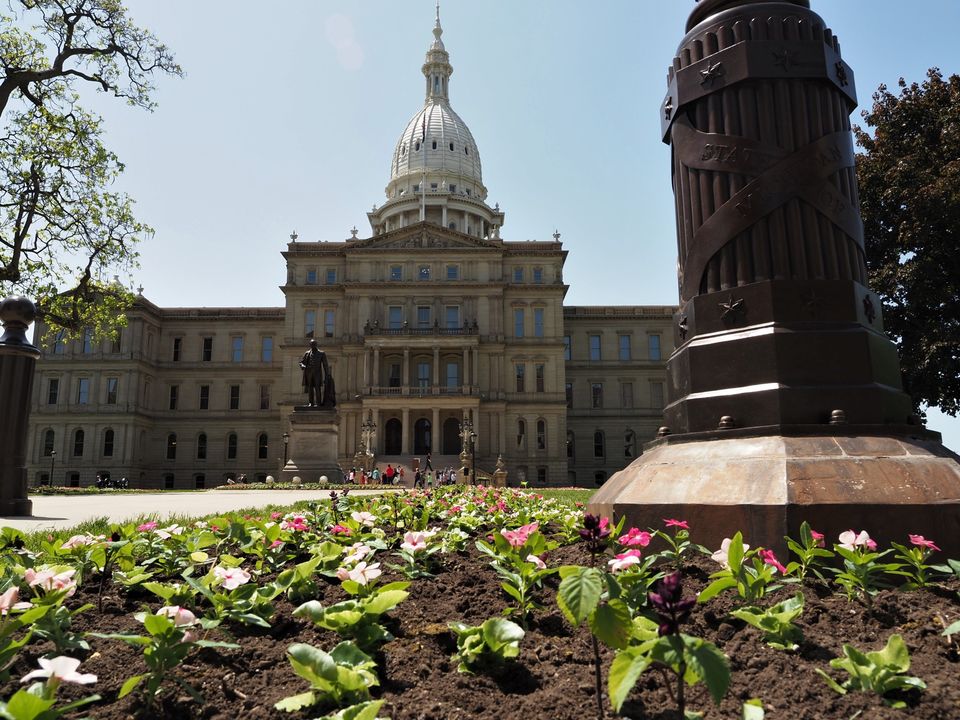
LANSING – The Eliot-Larsen Civil Rights Act, Senate Bill 4, (SB4) has now passed in both the Michigan House Judiciary Committee and House of Representatives today. This bill would expand statewide nondiscrimination protections to include sexual orientation and gender identity.
The bill now heads to the Governor Gretchen Whitmer’s desk, where it is expected to be signed into law, making it the first time in over three years since any U.S. state has passed similar nondiscrimination protections.
Once signed, Michigan will become the 22nd state to codify nondiscrimination protections for LGBTQ+ people.
In an email, Equality Michigan, the state’s largest LGBTQ+ advocacy group, lauded the action by lawmakers noting:
For our community, today is a day of triumph and a day of relief. The Michigan Legislature is sending a loud and clear bipartisan message: LGBTQ+ people are entitled to the same dignity, rights and protections as all Michiganders.
Equality Michigan and its predecessors have fought for decades to bring the LGBTQ+ community under the protection of the Elliott-Larsen Civil Rights Act. Generations of courageous community leaders and grassroots organizing created the path forward, and we are proud that today, history has been made.
“It is with great enthusiasm that I celebrate Michigan’s vital step toward equality and justice for all,” said Buzz Thomas, Equality Michigan Chairman and former Senate Democratic Floor Leader.
“Today’s passing of the amendment to the Elliott-Larsen Civil Rights Act will help ensure future generations of LGBTQ+ youth and their families, that they will have a fair opportunity to earn a living, feel safe in their communities, and have access to the necessities one needs to build a better life. This is something everyone in our state deserves.”
“Today is a big step for equality and sends a powerful message to LGBTQ+ Michiganders that discrimination has no home in our state. Michigan now joins alongside 21 other states who have sent this same message to their own LGBTQ communities and codified these protections into law,” said Erin Knott (she/her), Executive Director for Equality Michigan. “Today’s victory would not have been possible without years of hard work from generations of courageous leaders. We are witnessing a sea change toward equality, bringing us closer to a future where everyone is treated equally under the law, no matter our gender, the color of our skin, how we worship, or who we love.”
“LGBTQ people — like all people — deserve to be treated with dignity and respect and to live life free from discrimination. By codifying non-discrimination protections into state law, Michigan brings us one step closer to creating a society where LGBTQ young people never have to fear being turned away from a business or told they cannot participate in an activity or enter a public space just because of who they are or who they love,” said Gwen Stembridge (she/her), Advocacy Campaign Manager for The Trevor Project. “We thank and honor the years of hard work of our fellow advocates, community leaders, and partners like Equality Michigan, who led the way to where we are today. Amid the ongoing legislative attacks on LGBTQ communities, especially trans youth, this proactive law is a beacon of hope and optimism.”
-

 a&e features4 days ago
a&e features4 days agoMusical Mondays, a mainstay in WeHo nightlife, celebrates 16 years
-

 National3 days ago
National3 days agoDiscredited former cop played ‘key role’ in deportation of gay make-up artist
-

 Arts & Entertainment2 days ago
Arts & Entertainment2 days agoA Night of legacy, love, and liberation: Inside the 2025 April Fool’s Ball
-

 Arts & Entertainment4 days ago
Arts & Entertainment4 days ago‘Bring it to Brunch’ returns to West Hollywood
-

 Myanmar4 days ago
Myanmar4 days agoLGBTQ+ advocacy group joins Myanmar earthquake relief effort
-

 a&e features4 days ago
a&e features4 days agoPeppermint thrives in the spotlight
-

 California3 days ago
California3 days agoSouth Park provides green space to a predominantly Latino community
-

 Arts & Entertainment2 days ago
Arts & Entertainment2 days agoSouth Coast Repertory Theatre hosting world premiere production
-

 Movies1 day ago
Movies1 day agoHeartfelt ‘Wedding Banquet’ remake a romcom worth seeing
-

 Brazil1 day ago
Brazil1 day agoUS lists transgender Brazilian congresswoman’s gender as ‘male’ on visa





